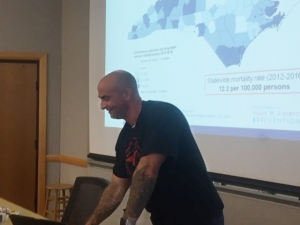Summit focuses on opioid epidemic responses, solutions
By Joey Pitchford
Published in News on April 30, 2018 10:44 PM

News-Argus/JOEY PITCHFORD
Jesse Bennett, volunteer coordinator/outreach worker with the North Carolina Harm Reduction Coalition, gives a presentation on ways to combat opioid addiction at Wayne Community College Monday.

News-Argus/JOEY PITCHFORD
News-Argus/JOEY PITCHFORD Representatives from several Wayne County organizations listen as Jesse Bennett gives a presentation on dealing with opioid addiction at Wayne Community College Monday. Among the audience were Sheriff Larry Pierce and Communities Supporting Schools in Wayne County Executive Director Selena Bennett.
By JOEY PITCHFORD
jpitchford@newsargus.com
Finding a solution to opioid addiction in Wayne County is a multifaceted process which will require compassion, understanding and some creative thinking, speaker Jesse Bennett said at Monday during a Harm Reduction Summit held at Wayne Community College.
Bennett, volunteer coordinator/outreach worker with the North Carolina Harm Reduction Coalition, was one of two speakers Monday.
He began by discussing the statistics regarding opioid addiction in North Carolina, including its financial cost to the state ---- around $2 billion in work as of 2016.
From 2009 to 2016, hepatitis C cases grew by 500 percent, Bennett said, alongside an increase in endocarditis and sepsis due to the reuse and sharing of needles.
As opioid use grew, so did law enforcement's use of naloxone, which reverses the effects of an opioid overdose. Only three law enforcement agencies carried naloxone in 2014 but that number ballooned to 218 ---- including Wayne County ---- by February of this year.
Bennett gave a brief demonstration of how to identify if a person in the midst of an overdose ---- they are unresponsive, have blue lips and ashen skin and are often making a gurgling noise.
The first thing people in the community can do to help someone who has overdosed is to call 911 immediately, knowing that they are protected by North Carolina's Good Samaritan law.
"The Good Samaritan law means that, if you call 911 in an overdose situation, you and the person who is overdosing are protected from litigation," he said.
"The law only extends to you and the person who is overdosing, nobody else."
Dealing with a problem as expansive as addiction will take more than knowing how to react to a single overdose situation, however.
That kind of change will need to take place in the hearts and minds of people and in how media represents those who are addicted, Bennett said, so that the public sees them as human beings and not simply as addicts or "junkies."
He called for an increase in "cultural competency," essentially a form of understanding what individuals are dealing with in their lives in order to best help them. He quoted author Terry Cross, in Cross' book, "Toward a Culturally Competent System of Care."
"When empowered, minority communities are up to the challenge of looking out for themselves," Bennett read. "The challenge to professionals is to develop the understanding necessary to embark on such an ambitious journey."
Meeting people where they are is a more effective way of getting them in to treatment than trying to shoehorn people into a rigid care system, Bennett said.
Prime examples of this concept are the syringe exchange programs which NCHRC operates around the state. At those locations, IV drug users can exchange dirty needles for clean ones and get other materials designed to reduce the risk of HIV and other harm as much as possible while they use.
Those who use the exchange programs are around five times as likely to enter drug treatment programs as those who do not, Bennett said.
Those programs have also reduced needle-stick injuries to law enforcement officers by 60 percent in the surrounding areas, Bennett said.
Society can help those dealing with addiction by treating them as patients in need of help and not simply criminals who are repeatedly making a bad decision, he said.
